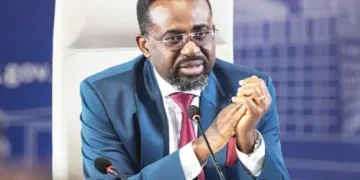BoG Governor Calls for Legislative Overhaul to Address Decades-Old Debt Accumulation by Gov’t
The Governor of the Bank of Ghana (BoG), Dr. Ernest Addison, has called for legislative amendments to the Bank of Ghana Act to address the longstanding issue of unpaid government borrowings from the central bank.
Speaking on Joy News’ PM Express Business Edition monitored by norvanreports on January 2, 2025, Dr. Addison proposed reforms requiring governments to repay borrowed funds within the same fiscal year to prevent debt accumulation.
“Once we put reforms in place that force governments to pay back in the same year, you will not have this accumulation of debt over 20 to 25 years,” he stated.
Tackling Decades-Old Debt
Dr. Addison highlighted the historical context of the issue, revealing that unpaid government borrowings have persisted since the PNDC era in the 1980s.
“In the books of the Bank of Ghana, there are borrowings that go back as far as the PNDC era that have not been paid,” he explained, adding that this legacy debt contributes to misconceptions about the BoG’s financial position.
He clarified that the much-criticized GH¢60 billion central bank loss represented years of accumulated borrowing, not a single fiscal year’s liability.
BoG’s Commitment to Fiscal Discipline
Defending the central bank’s autonomy, Dr. Addison cited its track record of zero financing for government budgets between 2017 and 2019. He emphasized that the temporary GH¢10 billion financing during the COVID-19 pandemic in 2020 was an exception, approved by Parliament.
“In 2021, we were back to zero financing, showing the central bank’s commitment to fiscal discipline,” he noted.
Enhancing Accountability and Transparency
Dr. Addison dismissed claims that the BoG’s independence is compromised, arguing that the focus should instead be on holding governments accountable for repayment obligations.
“Those who don’t believe the Bank is independent do not understand the issues. The BoG is operating effectively as it is,” he asserted.
The governor underscored the need for reforms to improve fiscal accountability and prevent long-term debt accumulation.
“It’s not about making the central bank more independent; it’s about ensuring that governments adhere to repayment obligations,” he explained.
Preserving Fiscal Integrity
Dr. Addison concluded by emphasizing the importance of legislative changes to ensure fiscal discipline and safeguard Ghana’s financial system.
“We need reforms that not only ensure fiscal discipline but also preserve the integrity of the financial system. It’s about making sure that the mistakes of the past are not repeated,” he said.
These proposed reforms, if implemented, could strengthen Ghana’s financial stability by aligning government borrowing practices with principles of fiscal responsibility.








